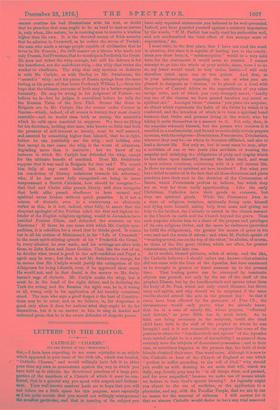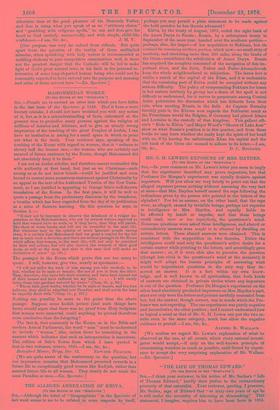LETTERS - TO THE EDITOR.
CATHOLIC " CHARMS."
(TO THB FAHTOR OF THE "SpEarsToa.:1 STH,—I have been expecting to see some rejoinder to an article which appeared in your issue of the 25th ult., which was headed, " Catholic Charms," and would willingly have left it to abler pens than my own to remonstrate against the way in which you have held up to ridicule the devotional practices of a large pro- portion of the members of a Church of which it must be con- fessed, that in a general way you speak with respect and forbear- ance. Your well-known candour leads me to hope that you will not refuse me a little space for this purpose, more especially as I am. quite certain that you would not willingly misrepresent the smallest particular, and that in treating of the subject you
have only repeated statements you believed to be well-grounded. Indeed, you have guarded yourself against a contrary imputation by the words, "If M. Parfait has really road his authorities well, and not misdeacribed the total effect of this strange mass of superstition," &c.
I must state, in the first place, that I have not read the work in question, but since it is capable of leading you to the conclu- sions you draw from it, " misdescription " would be a very mild term for the statements it would seem to contain. I cannot attempt to go into the whole of your article, since, were I to do so, my letter would reach to very undue limits, —I will only therefore touch upon one or two points. And first, as to your misconception regarding the use of what you are pleased to designate as " charms," to be placed on a level with the grigris of Central Africa or the superstitions of any other savage tribe, and of which you very strangely assert, "hardly any one of the charms we have quoted involves any moral or spiritual act." Amongst these " charms" you place the scapular, an object which represents the habit of the Order by which it is conferred, and the intention of which is to form a spiritual bond between that Order and persons living in the world, who by taking it unite themselves in a manner to it. Not only, then, is the scapular solemnly blessed, but the person who receives it is enrolled in a confraternity, and bound to recite daily certain prayers in union, with the religious.—Dominicans, Franciscans, Trinitarians, whoever they maybe—to whom he becomes affiliated, and also to lead a devout life. Not only so, but in most cases he may, after a novitiate of one or two years (the novitiate of wearing the scapular and satisfying the obligations of piety and charity which he has taken upon himself), demand the habit itself, and wear it upon solemn occasions, embracing with it a still stricter life. Is there no moral or spiritual act here involved ? But what you have failed to arrive at is the fact that all these devotions and pious practices have their root in the doctrine of the Communion of Saints, which Protestants profess to believe, but which they are so very far from really apprehending. Like the early Christians, Catholics have their goods in common, but they are spiritual goods. While the Protestant lives in a state of religious isolation, spiritually living unto himself and dying unto himself, asking help from none and giving no help to his brother, the Catholic is united in the closest manner to the Church on earth and the Church beyond the grave. Thus each scapular admits him to a share of the prayers and privileges of its own religious Order, and the more he embraces (provided he fulfil the obligations), the greater the means of grace to his own soul and the souls of others ; and when M. Parfait speaks of "wearing several, one on the top of the other," he alludes, of course, to those of the five great Orders, which are often, for greater convenience, united into one.
As to medals, blessed pictures, relics of saints, and the like, the Catholic believes—I should rather say, knows—that miracles did not cease with the lives of the Apostles, but have continued to be wrought in greater or lesser measure up to the present time. That healing power can be conveyed by inanimate objects was proved, not only by the use of the staff of the prophet Eliseus, but by the handkerchiefs and aprons taken from the body of St. Paul, which not only cured diseases, but drove away evil spirits, and why should we be surprised if the same results should attend like acts in the present day? So that if cures have been effected by the garments of Pius IX., the circumstance would only prove, what we already know, that he is a man of saintly life, whose prayers, " effectual and fervent," as your Bible has it, avail much. As to faith not being necessary in the recipient, could the dead child have faith in the staff of the prophet to whom he was brought? and is it not reasonable to suppose that some of the persons to whom the "handkerchiefs and aprons" of the Apostles were carried might be in a state of insensibility ? as some of them certainly were the subjects of demoniacal possession ; and in their case, as sometimes happens in the present day, the faith of their friends obtained their cure. One word more. Although it is new to the. Catholic to hear of the Church of England as one which " prefers to suffer according to the will of God," why should
you credit us with desiring to set aside that will, which we daily, nay, hourly pray may be " in all things done, and praised,
and for ever magnified," because we make use of means which
we believe to have God's special blessing? As logically might you object to the use of medicine, or the application to a physician, and say, with the Peculiar People, that We are to its no means for the removal of sickness. I will answer for it that no sincere Catholic would desire to have any trial removed
otherwise than at the good pleasure of his Heavenly Father, and that in using what you speak of as an "arbitrary charm" and " gambling with religious spells," he can and does give his heart to God entirely, unreservedly, and with simple, child-like
[Our purpose was very far indeed from ridicule. But quite apart from the question of the reality of these multiplied miracles, when sprinkling with holy waters is recommended as enabling students to pass competitive examinations well, is there not the greatest danger that the Catholic will be led to make light of God's great natural laws, in his faith in the personal in- tercession of some long-departed human being who could not be reasonably expected to have entered into the purpose and meaning and value of those natural laws ?—ED. Spectator.]



































 Previous page
Previous page